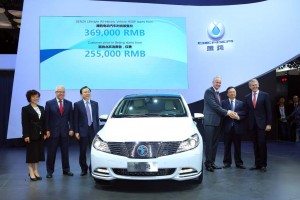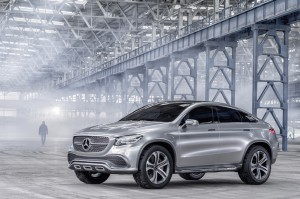No issue has bedeviled Daimler AG more than China, where the company’s underwhelming performance lags archrivals BMW and Audi, which have used their successes with Chinese consumers to vault ahead of Mercedes-Benz in global sales.
Mercedes is hoping that this year’s Beijing Auto Show will serve as a tipping point, however, as it sets out to recapture some of the lost ground. Indeed, the China Daily suggested that Mercedes-Benz outspent its rivals at the crowded show this year in an effort to capture the attention of both the press and Chinese consumers.
Dieter Zetsche, chairman of Daimler’s board of management, made the long journey to China after skipping the New York Auto Show, and Daimler hosted separate press conferences for its Mercedes-Benz and Sprinter brands, as well as a joint preview of a new electric vehicle it will build with Denza, one of its Chinese partners.
Among the highlights for the German maker, Mercedes-Benz showed off the Concept Coupe designed specifically for China, according to Zetsche – though it is closely modeled after the upcoming MLC crossover — the long-wheel-base version of the C-Class, and special models such as A45 AMG 4matic and the AMG S63.
(Click Here for more on the Mercedes-Benz Concept Coupe.)
At another press conference, a Daimler joint venture company, Shenzhen BYD Daimler New Technology Co. Ltd., or BDNT, showed the Denza all-electric vehicle for the first time.
The Denza is the product of a 50-50 technology joint venture established by Daimler and Chinese domestic maker BYD back in 2010. It was the first Sino-German joint venture dedicated specifically to developing an all-electric vehicle for the Chinese market, where government regulators hope battery power can help address the country’s endemic air pollution problems.
(For a closer look at the Mercedes-Benz S63 AMG 4Matic Coupe, Click Here.)
The venture combines Daimler’s engineering expertise with BYD’s battery technology to produce what was described as a “modern urban vehicle concept” that will target both private and fleet customers.
“Daimler is constantly moving forward with emission-free mobility; and with our Denza we are also on the right track in China, which is destined to become the world’s most important market for electric vehicles“, said Hubertus Troska, Member of the Board of Management of Daimler AG with responsibility for China, and Chairman and CEO of Daimler Greater China.
Troska, who assumed his post in 2012 after Daimler order an emergency re-organization of the company’s operations in China, said the battery car project is “proving our full commitment to the country.”
A few weeks back, Zetsche, who has come under fire back home in Germany for the company’s underwhelming performance in what is now the world’s largest automotive market, told shareholders at Daimler’s annual meeting in Berlin that the company’s fortunes in China were improving.
“The Chinese word for Benz is ‘ben-chi’ and also means ‘gallop’. And that is exactly what we have been doing here in China – in keeping with the ‘year of the horse’ – since the start of the first quarter, which we have completed very successfully with a sales increase of 47%,” Zetsche said during his visit to Beijing.
Zetsche said that Daimler expects more growth this year in China, where the demand for luxury cars continues to expand. “With eight more new models for the local market, as well as the expansion of the distribution network by 100 dealerships in 40 cities, Mercedes-Benz is laying the groundwork for increasing its sales to 300,000 units by 2015,” he said.
However, Mercedes-Benz still lags behind key rivals such the Volkswagen Group’ s Audi brand, the Chinese luxury market leader, as well as BMW. Both of those competitors have built strong followings in China, which they have used to claw ahead of Mercedes-Benz in the global luxury sales race.
(Daimler betting big on fuel cell vehicles. Click Here for the story.)
The resulting shift created by the rising importance of the Chinese market has stunned Mercedes-Benz, which had led in luxury car sales for a number of years. Now even Daimler insiders admit Mercedes-Benz might not have the capacity in place in China to overtake their rivals by the end of the decade as Zetsche has promised.
Daimler’s failings in China, however, can be traced all the way back to the 1990s when it acquired Beijing Jeep as part of its short-lived “merger” with the Chrysler Corp. Beijing Jeep was consistently profitable for Chrysler but its Chinese partners were looking for new technology from Chrysler and then Chairman Robert Eaton was did not want to release it to them, according to former company officials.
After the 1998 acquisition, Daimler executives deferred to Eaton and Beijing Jeep began to decline after the Chinese government opened the door in 2000 to vehicle ownership by private citizens.
However, Daimler’s German management was also skeptical of the joint venture structure required by the Chinese government, according to one knowledgeable source. Even as late as 2007, with the Chrysler Group up for sale, Daimler’s executive still seemed undecided about the fate of Beijing Jeep.
It was only in 2008 that Daimler finally recognized the potential of the Chinese joint venture, but by then, rivals such as Audi and BMW were already making major inroads in the country. China is now the world’s second-largest luxury automotive market, and it’s expected to overtake the U.S. before decade’s end. Simply keeping up with the growth of China’s luxury sector is a challenge for Daimler, and regaining its early lead is likely to prove even more difficult.
(Click Here for complete coverage of the 2014 Beijing Auto Show.)


